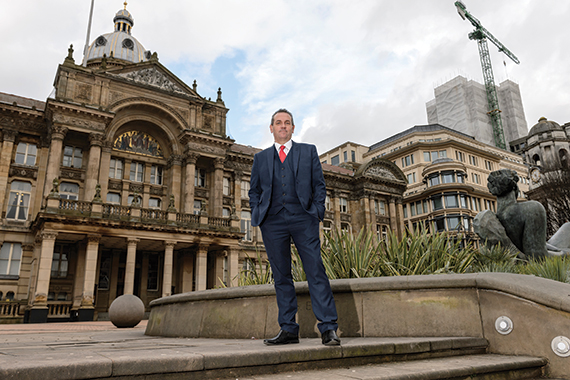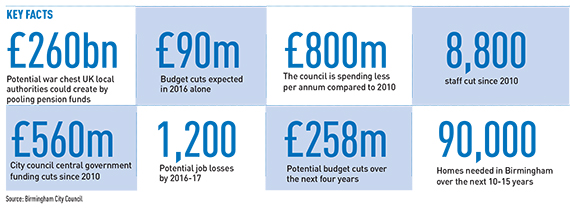Leader of Birmingham City Council was never an easy job, but having taken over in December, John Clancy says he is more than up to the challenge and is ready to turn the city’s fortunes around. Lisa Pilkington meets him. Portrait by Simon Hadley
Outside the windows of John Clancy’s office in Birmingham’s city centre Council House, the redevelopment of the Paradise scheme – a 1.8m sq ft mixed-use redevelopment in which the local authority is a major partner – is in full swing.
 The loud rumble of the demolition process, dismantling the brutalist architecture of the 1960s-built Central Library, is a fitting soundtrack to Clancy’s first property interview since becoming the new leader of Birmingham City Council in December. A new broom is not only brushing away the outdated and unloved architecture of Birmingham’s past, but also sweeping through the corridors of power in the UK’s second city.
The loud rumble of the demolition process, dismantling the brutalist architecture of the 1960s-built Central Library, is a fitting soundtrack to Clancy’s first property interview since becoming the new leader of Birmingham City Council in December. A new broom is not only brushing away the outdated and unloved architecture of Birmingham’s past, but also sweeping through the corridors of power in the UK’s second city.
Clancy, a 55-year-old married father of one, former teacher and solicitor (see CV, p75) is just weeks into the role of leader of Europe’s largest local authority, with an annual spend of £3bn. When he meets Estates Gazette – wearing the obligatory red tie for a Labour politician and a sharp three-piece navy blue suit – he appears thoroughly undaunted.
Prior to taking on the leadership role, Clancy was relatively unknown to the property industry. He recognises the need to get out urgently and press the flesh and will be a key part of Birmingham’s presence at next month’s MIPIM event in Cannes.
“It is a tough and challenging job, but I asked for it – literally,” he says. “Sir Albert warned me about the 12-hour days, but not the 16-hour ones.” That’s Sir Albert Bore, Clancy’s high-profile and controversial predecessor, who stood down last November having been in the firing line since Sir Bob Kerslake’s damning report into the local authority was published in December 2014.
The 68-page report labelled the council as being “dysfunctional” and heavily criticised Bore’s micro-management style. It is clear that while Clancy and Bore share the same political allegiance, they are poles apart on how they believe Birmingham should be governed.
“As part of the Kerslake review we had to reset relationships between the city and the council,” says Clancy. “On my second day in the job I sat down with the chief executive Mark Rogers, and said ‘I don’t want to run the council, that’s your job. You earn three times as much as I do’. That frees Mark and I up. It takes the shackles off us both and allows me to get out and about meeting new people.”
But he warns: “That does not mean I am going wave a white flag, quite the opposite.”
Remedying the wrongs identified by Kerslake aside, Clancy’s key priorities could equally apply to any of his major UK city peers: economic growth, tackling a huge housing and skills shortfall, devolution and attracting more foreign direct investment.
Before he can get stuck into those issues, however, Estates Gazette suggests he will first have to avert the threat of having services taken over by central government if things at the council do not improve. He nods solemnly: “It is a pressure for everyone on the senior team, we are conscious of it every day. But the government has said that Birmingham is going in the right direction, which is a huge relief to us. We have the government panel here until the end of March. We are hopeful we will have done enough by then to be able to get on with the job.”
The council also has until the end of March to set its budget. Looking at the headline figures (see below) Clancy and Rogers certainly have their work cut out. He comments: “We are half the size we were in terms of workforce and we are spending huge amounts less. This council has to change from a revenue spend local authority to a capital spend. By 2020, we will be almost exclusively funded by business rates.”
Economic growth is Clancy’s mantra and how he expects Birmingham to flourish. “Only by economic growth will our revenues be repaired.” That means more public/private sector partnership. And more attention to property matters. He adds: “I have realised since taking on the role, that property investment is key to the success of the city’s growth. For example Chinese investment for housing will be really important.”
Clancy has also been banging the drum about a West Midlands Sovereign Wealth Fund, Brummie Bonds, forming a regional investment bank, as well as divesting much of the council’s property portfolio. His recent book The Secret Wealth Garden argues that UK local authorities could create a single asset pot of more than £260bn if pension funds were pooled, to invest in new houses and infrastructure.
Henrietta Brealey, director of policy at the Greater Birmingham Chambers of Commerce, says the idea could exploit a “potentially great untapped asset”. She says: “Exploring innovative ways of raising the funds to continue to invest in affordable homes and communities is thoroughly sensible.”
Clancy is also reviewing the council’s property assets, something that has received limited attention to date. He plans to sell off the less important and attractive buildings and sweat or use securitisation of the ones that will remain to promote revenue generation.
“We are under pressure to get our assets right and we need strong expert input. I want to bring the big minds of the city together. Use their brains and ask what kind of new board or nexus relationship there needs to be between the council and the business community? The council could be the entity that derisks projects with land or uses our capacity to derisk borrowing. We are working through this process now.”
As a board member of the West Midlands Combined Authority, Clancy has been key in drafting the detail of the devolution deal, which is yet to be formally signed off. He says that although the WMCA will not have any planning powers at this stage, it will have “real money in its bank account”, £35m in year one and £1bn in total.
“We now need to prepare a second deal,” he says. “Housing, manufacturing and skills are all very important. We are well down the line on detail and have pooled all our resources for the past three months. It will become a reality soon – possibly in May or June.”
In the meantime, Stockport-born Clancy is keeping a close eye on the northern powerhouse: “They stole a political march, but that is all they really did. Birmingham is ready to take off and we’ll match Manchester and overtake it.”
John Clancy CV
- Born 1961, Stockport
- Education Keele University, graduated in law and English
- Early 1990s Practised as a solicitor in Birmingham, specialising in commercial and venture capital law
- 1995-2002 Chaired the Birmingham Edgbaston constituency Labour Party
- 2001 Parliamentary agent for Gisela Stuart MP
- 2002-2006 Councillor for Hodge Hill, Birmingham, retired from the role at the end of his second term in 2006
- 2004-2006 Served Birmingham City Council planning committee and again from 2011 to date
- 2009-2014 Visiting lecturer at the University of Birmingham Business School
- 2011-present Councillor for Quinton Ward in Birmingham. Re-elected May 2015
- Dec 2015-present Leader Birmingham City Council
- Lifestyle Married to Rachel for 29 years, with one daughter. Likes darts. Has lived in Birmingham for 25 years, previously lived in Taunton, Somerset. Has published two books: Blogs from the Blackstuff (2010) and The Secret Wealth Garden (2014).












